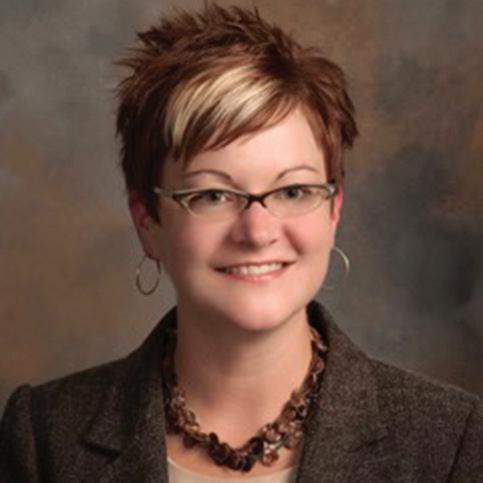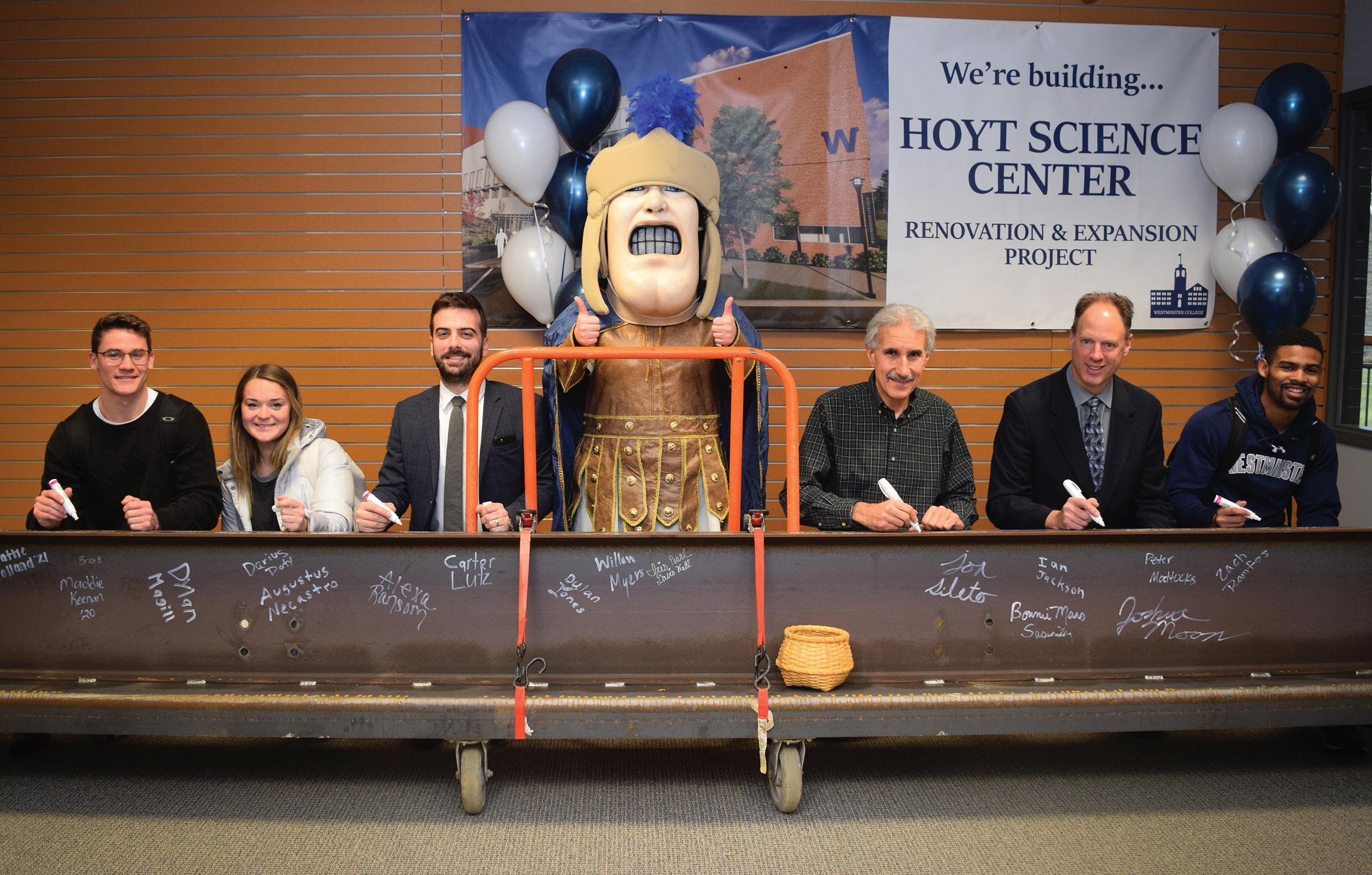
8 minute read
Titan Spotlight: Ericka Peterson ’03, Loretta Grate Bolyard ’00 & Brent Witgen ’00
TITAN SPOTLIGHT
The Science of Success Looking back at a remarkable neuroscience cohort and the careers built on a Westminster education
By VALENTINE BRKICH ’97
Around 20 years ago, deep down in the research labs of Hoyt Science Center, a tightly knit cohort of undergrads were working hard and laying the foundation for successful careers in psychology and neuroscience. Three of these students—Ericka Peterson ’03, Loretta Grate Bolyard ’00 and Brent Witgen ’00—went on to work in an Ivy League research laboratory and ultimately earned their doctorates.
For Dr. Alan Gittis, professor of psychology emeritus and former leader of this notable cohort, the success of these three comes as no surprise.
“There was just something special about this group,” says Gittis, who taught at Westminster from 1976 to 2011 and was instrumental in developing the neuroscience curriculum. “They all shared a passion for learning, for discovering something of significance.”
Westminster’s Neuroscience Program is an interdisciplinary major that emphasizes hands-on experience through intensive lab work and practical internships. Students also complete senior research projects, which gives them the opportunity to present at national scientific meetings and publish in professional journals.
As laboratory director, Gittis made sure his students worked on projects that were meaningful. “I wanted to make sure they felt ownership of their work and that it would garner interest from the greater scientific community.”
It was research in the Hoyt laboratory that, in fact, drew the attention of a pharmaceutical start-up, which opened the door to work in a graduate laboratory at the University of Pennsylvania—an opportunity that would serve as a springboard for their successful careers.
Personally, for Gittis, the work of these three students also had a direct and positive impact on his own career.
“My success really had little to do with my professional training or professional colleagues,” says Gittis, who won the college’s Distinguished Faculty Award in 2009 and was awarded the Lifetime Achievement award in 2010 by the Faculty for Undergraduate Neuroscience.
“It had much more to do with the efforts of students who were as rewarding to work with as Loretta, Brent and Ericka.”
When Dr. Brent Witgen, left Erie for New Wilmington back in 1996, he figured he’d be spending most of his time in Memorial Field House. As it turned out, it would be in the research labs in Hoyt.
Witgen, who came to Westminster on a basketball scholarship when the College was a member of NAIA and a NCAA D-II school, started out in business administration before switching to psychology. “I couldn’t stand accounting,” he says, “which is ironic, considering my current work.”
Today, as director of laboratory operations and site lead with
Foundation Medicine in San Diego, he’s helping to build a new lab site for the organization. “It’s funny, neuroscience led me here, but now I’m closer to the business side of things.”
As part of the neuroscience cohort, Witgen used lab rats to study learning and memory. “It was a dirty job,” he says, “with a lot of lab time and hands-on experimentation.”

Though the work was hard, he says Gittis constantly pushed him and the others to keep experimenting and learning. “He was extremely forward thinking—a real pioneer in terms of thought leadership and the future of our field.”
Witgen went on to graduate school at the University of Pennsylvania before being accepted into Aarhus University’s (Denmark) neuro-stereology Ph.D. Program in 2004, where his research focused on brain trauma. He did his postdoctoral work at the University of Copenhagen, where he coordinated the research efforts for the International Alliance of Research Universities.

While in Denmark Witgen was able to travel extensively throughout Europe and Asia. Eventually he landed a position with Novo Nordisk in Beijing, where he worked his way up from research scientist to senior director of development bioanalysis. “It was a great learning experience,” he says. “We did a lot with drug development for diabetes, which is big in U.S. right now.”
Witgen says what’s great about a liberal arts degree is that the return-on-investment, although it can take time, definitely pays off. “Westminster taught me concepts like lifelong learning, curiosity and empathy, all of which have helped me in my studies and career abroad. It made me a better, more open-minded person.” “Westminster taught me concepts like lifelong learning, curiosity and empathy, all of which have helped me in my studies and career abroad. It made me a better, more openminded person.”

DR. BRENT WITGEN ’00 Director of Laboratory Operations & Site Lead, Foundation Medicine

DR. LORETTA BOLYARD ’00 Clinical & Forensic Neuropsychologist, Co-founder of Mountain West Psychological Resources G rowing up on the “wrong side of the tracks” in Columbiana, Ohio, Dr. Loretta Grate Bolyard never thought college was a possibility. Then the Youngstown Shriners stepped in and offered her a full scholarship to Westminster.
Bolyard first met Gittis after switching majors from accounting to psychology. “I was coming from a totally different place in the world,” she says. “Dr. Gittis took me under his wing and helped me fit in there. He clearly cared about me.”
As part of the cohort, Bolyard spent a lot of time in the lab. “We were in there pretty much every day, running rats, cleaning the lab or studying. It was my safe place.”

She also had the opportunity to attend national neuroscience conferences in places like San Diego and New Orleans, where Gittis taught them how to network and communicate with leaders in the field. “That really shaped my career.” At one conference Christopher Reeves was the keynote speaker, and somehow Gittis was able to get them front-row seats. “He was giddy with excitement,” says Bolyard. “That still makes me giggle.”
After graduating, Bolyard worked for a neurosurgeon at Children’s Hospital of Philadelphia and then Dartmouth. She then entered the University of Montana, earning a master’s degree in neuroscience in 2010 and finishing her Ph.D. in clinical psychology in 2011.

Today, Bolyard works as a forensic and clinical neuropsychologist in Butte, Mont. She founded Mountain West Psychological Resources in 2014, and now employs five other psychiatric providers. “We have such tremendous need here,” she says. “I want to be part of the solution—you know, pay it forward.”
Bolyard feels very fortunate to have attended Westminster and studied under Gittis. “I made some dear friendships that have lasted a lifetime,” she says. “Dr. Gittis was a patient and kind man who I could trust and count on. He changed my life.”
Dr. Ericka Peterson has always had a passion for science. From a very young age, she was participating in science fair projects and later, in high school, she became increasingly interested in brain function, structure and development. So when she visited Westminster and learned students could conduct research as early as freshman year, Peterson knew she’d found her home.
“The fact they offered a neuroscience degree within the liberal arts curriculum really attracted me,” she says. “I liked the focus on interdisciplinary studies, as well as the personal and educational development courses.”
Today Peterson continues to feed her passion as the director of the Office of Postdoctoral Affairs at Columbia
University in New York City, where she provides leadership in comprehensive initiatives, policies and activities in support of the university’s goals. “I support the person in the postdoc and strive to provide an environment where mental health and wellness resources are available to all.”
Peterson has fond memories of her time in the neuroscience cohort. “We built a small community in the basement of Hoyt with each other and our rodents-in-residence, and Dr. Gittis was my first true academic mentor.” She remembers Gittis driving them to Case Western in his minivan to hear Jane Goodall speak. “It’s just one example of how he exposed us to the greater scientific community.”

During her senior year, Gittis encouraged Peterson to apply for one of 10 national awards for excellence in undergraduate research at the Society for Neuroscience conference. “I was fortunate to win and to be able to present my work at the largest conference in the field.”

Peterson says Gittis also encouraged them to gain independence, something every researcher needs. “Your ultimate goal is to be independent. It’s incredible to think that a small, liberal arts school in Western Pennsylvania could offer such a robust, basic science research program.”
Although she’s no longer performing bench work, Peterson credits Westminster with giving her a strong foundation in basic science research and academic rigor. “If it were not for the early influence and education I received at Westminster, I would not be where I am today.” S

DR. ERICKA PETERSON ’03 Director of the Office of Postdoctoral Affairs, Columbia University










